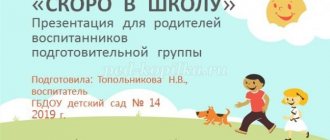Parents' meeting "Training to meet parents of first-graders"
Training to meet parents of first-graders.
1 Presenter (teacher).
Good afternoon dear parents!
2 Presenter (psychologist).
Hello!
1 Presenter (teacher).
We are glad to see you at our first parent meeting
Today we will try to get to know each other better, talk about our feelings, and also touch on the main organizational issues.
2 Presenter.
The meeting will be held, your first teacher...
1 Presenter (teacher):
and teacher - school psychologist Vagina Yu.D.
We are very pleased to meet you. The moment of our meeting is also characterized by the fact that not only you, but also we are worried. Will we like each other? Will we find mutual understanding and friendship? Will you be able to hear, understand and accept our demands and help our little first-graders? The success of our joint work with you depends on this. We are meeting some parents for the first time, others we already know. We are glad to see you all.
2 Presenter (psychologist).
Let's start our meeting with a small positive note, greet each other... Take each other's hands, feel the warmth of your hands, look at each other, smile... Let your smile give a good mood to everyone present... now we are one big family...
The little man who crosses the threshold of school needs a good friend and mentor! The one who will help him overcome the fear of the unknown that awaits the baby beyond the school threshold! The one who will help make a very important discovery, whose name is KNOWLEDGE. Among the many wonderful teachers who work with children at school, a special place is given to her - the first teacher. Children remember their first teacher all their lives...
We have prepared a short presentation for you that will introduce you to your first teacher...
Show presentation...
1 Presenter (teacher). A few words about myself...
Thank you for your attention…
2 Presenter.
You met your first teacher, and now let’s get to know each other...
Exercise: “mini-presentation of yourself.”
We will take turns handing over the balloon, and the one who has it must introduce himself and talk about himself and his child.
Inscriptions on the ball: state your name; — a few words about yourself (where you work, your hobbies, strengths, virtues, life principles). Please pay attention to positive personal characteristics that might be of interest to everyone present.
Thank you for the interesting acquaintance.
1 Presenter (teacher). Now let’s do the exercise “Basket of Feelings”
“Dear moms and dads! I have a basket in my hands, at the bottom of which there are a wide variety of feelings, positive and negative, that a person can experience.
After your child crossed the school threshold, feelings and emotions settled firmly in your heart and filled your entire existence.
Now we will hand over this basket, and I will ask you to tell us about your impressions about your child’s education at school,” what worries you, what worries you, your feelings...
Thank you for your performance...
2 Presenter.
From the first of September, everything will be new for your children: lessons, teacher, school friends. It is very important that you, loving parents, are close to your children.
1 presenter
. Now you and I are one big team. We have to rejoice and overcome difficulties together, grow up and learn.
2 presenter
. To learn is to teach ourselves. As a rule, their mothers and fathers, grandmothers and grandfathers study together with children. The teacher also studies with his students.
1 presenter.
I hope that our team will be friendly and united throughout the four years.
- Tell me, can you make a clap with one palm? Need a second hand. The clap is the result of the action of two palms. The teacher is only one palm. And no matter how strong, creative and wise she is, without a second palm (and it is in your face, dear parents), the teacher is powerless.
From this we can derive the first rule
:
— Only together, all together, we will overcome all the difficulties in raising children.
2 presenter
You have cut out flower silhouettes, paints and colored pencils on your tables. Take everything one flower at a time. Color them.
Show me what you got...
Now compare your flower with the flowers of your neighbors. All the flowers were the same in size, color and shape.
- Tell me, after you have painted a flower, can you find two completely identical flowers? (No.)
We, adults, UNDER THE SAME CONDITIONS, do everything differently. Hence our second rule:
- never compare your child with another! There is no one or something better or worse. There is OTHER!
We will compare, but these will only be the results of the same child yesterday, today and tomorrow. This is called MONITORING. We will do this in order to KNOW HOW AND WHAT TO DO WITH THIS TOMORROW.
We will do this in order to grow every day. And not only in studies, but also in actions.
Color tells about your emotional state and the perception of people around you.
Blue
color indicates that you see yourself or another person as conscientious, calm, but somewhat cold;
red
– friendly, sociable, energetic, confident, but irritable;
pink –
tender, sensitive, vulnerable;
orange
-
flexible, kind, sympathetic, artistically gifted, in a good mood, but superficial, with unstable interests and a tendency to get carried away;
yellow –
very active, open, sociable, cheerful;
purple
–
restless, emotionally tense, in need of emotional contact;
brown
–
dependent, sensitive, relaxed;
black
–
silent, selfish, hostile, rejected.
1 presenter
- And now I offer you the well-known fairy tale “Kolobok”
in a psychological way and ask you to take an active part in its analysis.
So, let's begin. (Parents help in retelling the fairy tale using pictures.)
Once upon a time there lived a grandfather and an old woman. They didn't have children. They were lonely, and they decided to bake a bun. What did they do? Right. They swept along the bottom of the barrel, scraped along the box, and they got a bun.
First commandment:
A child born into a family should always be welcome.
They scraped the bottom of the barrel, swept the box, and they got a bun. They put it on the windowsill to cool.
Second commandment:
Do not leave small children unattended.
The bun rolled along the path and met there first a bunny, then a bear, then a wolf.
Third commandment:
Teach your child to communicate with the outside world.
He met a gentle, cunning fox.
Commandment four:
Teach your child to recognize good and evil, the true intentions of people.
The fox ate the bun.
Fifth commandment:
Teach your child to overcome difficult life situations independently with honor and dignity, without damage to life.
This is the well-known fairy tale we have with five important commandments for your child.
2 Presenter.
Now let’s imagine our child in the form of a flower...
Flower
- this is your child, our student.
Flower roots
- preschool maturity. If a child attended kindergarten, it is easier for him to adapt to the conditions at school, because... your child already knows how to play and communicate with children. Children at home are more constrained, tense, often lost, experience increased anxiety and are afraid of school.
Leaves
— general psychological development and self-regulation.
They are the ones who contribute to the qualitative development of the flower, i.e. your child. Look, in this picture the skills of writing, reading, and counting are not indicated anywhere. If a child has well-developed higher mental functions, then these skills will be successfully formed and developed. This is how your baby, the flower of your life, develops and grows.
For more successful adaptation, development of your child and assistance to the teacher in the learning process, systematic psychological work is needed.
According to order No. 636 of the Ministry of Education of Russia dated October 22, 1999. (Appendix: “Regulations on the service of practical psychology in the system of the Ministry of Education of the Russian Federation”) MBOU NOSH No. 3 provides psychological support for the educational process.
The main goal of psychological support of the educational process is the personal development of students, their socio-psychological adaptation in combination with self-realization.
As part of the psychological support of the learning process, the following is carried out:
— correctional and developmental work;
— advisory and educational activities;
- preventive work.
There are application forms on your desks that you must sign because... I can work with children within the framework of psychological support only with the consent of the parents.
Thank you very much for your trust, I will try to justify it...
1 presenter:
main points on organization...
- Choosing a parent committee...
In order for our communication to be more fruitful, for our connection to become stronger, we need to choose a parent committee, the first and main assistant in the class...
Your suggestions…
- Other organizational issues...
Reflection.
At the end of our meeting, I ask you to leave a few lines on the sheets regarding our meeting. Your impressions: what you liked, what you didn’t, your recommendations, wishes to the presenters...




